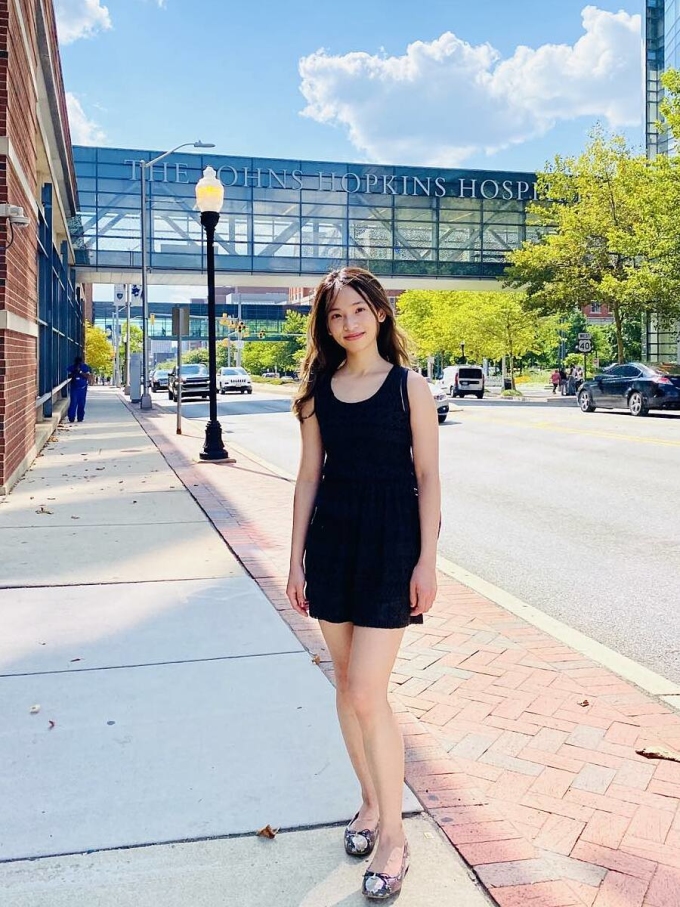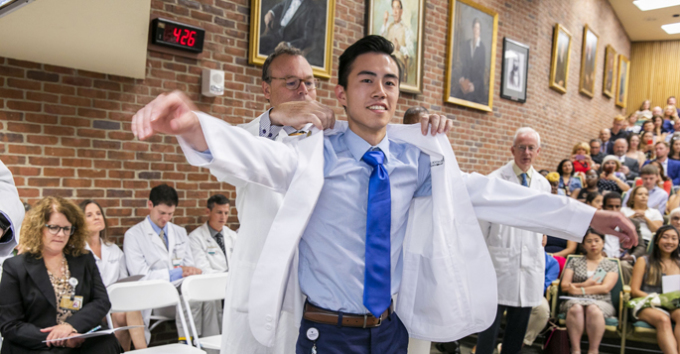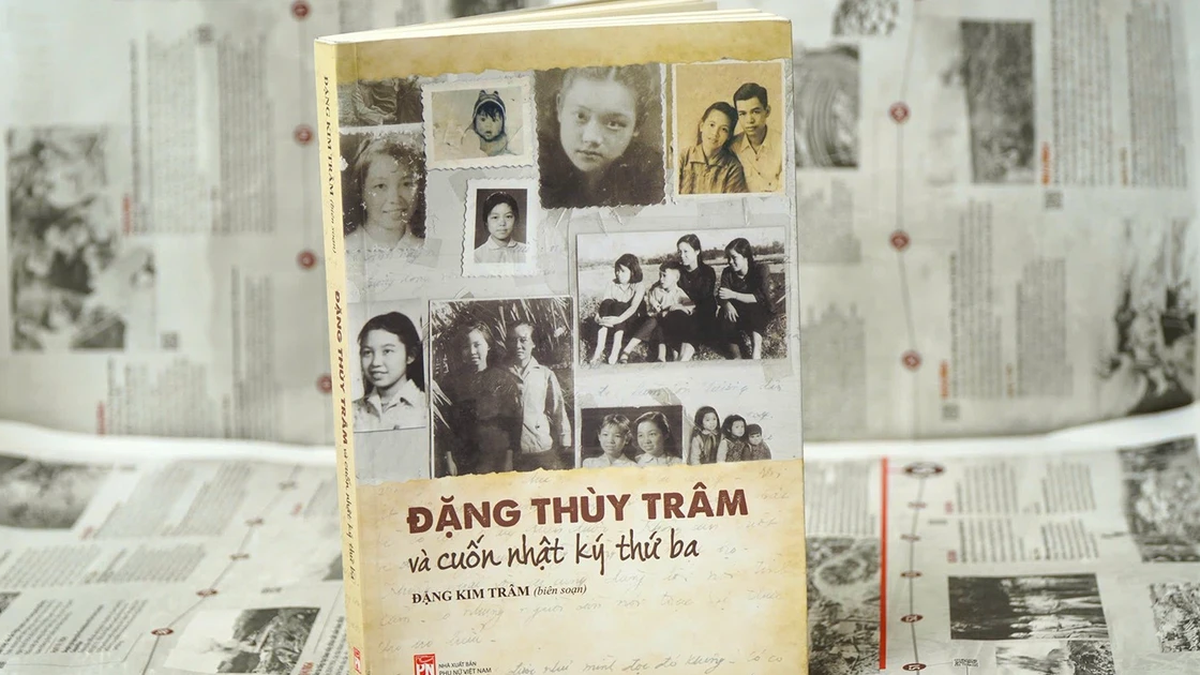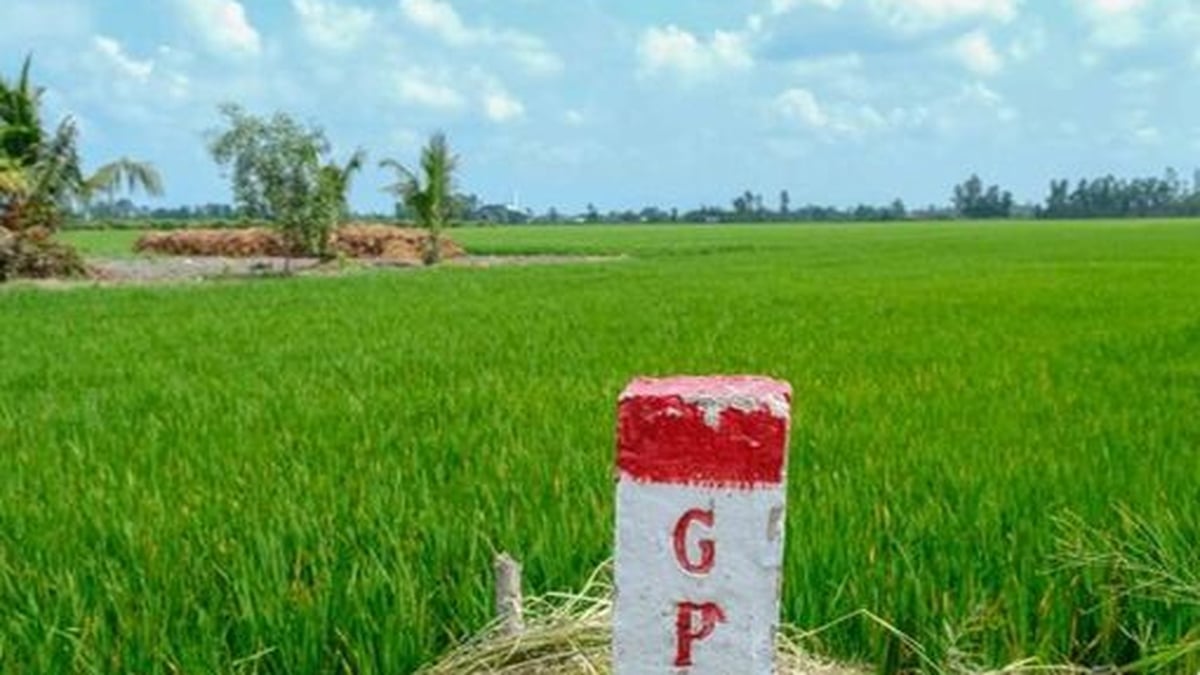Ranked in the top 5% of her college class and with standardized test scores in the top 3% of the nation, Mai Chi also had to overcome a host of other challenges when applying to medical school.
Medicine is the most expensive major in the US, with tuition fees of around $60,000 (VND1.4 billion) per year. Statistics from the Association of American Medical Colleges show that the number of applicants to medical school in 2021 increased by nearly 38% compared to 9 years ago.
The average acceptance rate for medical schools in 2023 is 4%, with some schools even accepting 0.43% of all applicants, which is lower than many other fields of study such as Engineering, Technology, and Business.
Trinh Mai Chi, 25, a PhD student in medicine with a 100% tuition scholarship at Johns Hopkins University, said that to apply to a medical school in the US, candidates need a bachelor's degree, regardless of the field of study. However, the schools have many requirements and many strict and rigorous evaluation rounds.
“It was a really tough process,” said Chi. The Hanoi girl was a German major student at the Foreign Language High School, Hanoi National University, and won a scholarship to study for a bachelor’s degree in Biochemistry at Wellesley College in the US in 2016.

Trinh Mai Chi at John Hopkins University, 2022. Photo: Character provided
According to Chi, the two important criteria are academic achievement in college (GPA) and MCAT (Medical College Admission Test) score - an exam of the Association of American Medical Colleges (AAMC).
The MCAT has four sections: Biological and biochemical foundations of living systems; Chemical and physical foundations of biological systems; Psychological, social and biological foundations of behavior; and Critical analysis and reasoning skills. Each section has 53-59 questions, lasting 90-95 minutes, and the maximum score for the test is 528.
According to US News statistics based on 2021 ranked medical schools, the undergraduate GPA of admitted students is 3.77/4, MCAT score is 512/528.
Another requirement for applying to medical school is that applicants must have completed a number of undergraduate courses such as Biology, Physics, Mathematics (ideally a course in calculus and statistics), Chemistry (which must include general chemistry, organic chemistry, and biochemistry). These courses must include practical skills in the laboratory. In addition, Psychology, Sociology, English (similar to Literature in Vietnam) or specialized writing.
Some classes are not required but may give applicants an advantage, such as: Art or music (to enhance visual or auditory observation skills); Interdisciplinary courses on death and grief (to care for patients who are ill or terminally ill); Foreign languages (to communicate with patients who do not speak English); Medical anthropology or History, Religion.
When applying in 2021, Mai Chi had a GPA of 3.97/4, in the top 5% of Wellesley College; MCAT score of 519/528, in the top 3% of the entire United States. She also completed 15 other courses in parallel with the Biochemistry program, including International Literature, Sociology... by enrolling in available classes at the school.
Nguyen, 27, who worked for four years in the academic department of a hospital in Reading, Pennsylvania, said these are essentially mandatory admissions requirements, although some universities may give preference to students of color or those who are first-generation college students.
But stellar grades and MCAT scores aren’t enough. In an August 2022 article for US News, Keith Baker, assistant dean of admissions at the University of Virginia School of Medicine, noted that the two most common obstacles holding applicants back were lack of clinical experience and lack of community service.
“You have to have clinical exposure,” he said, saying that medical schools know whether an applicant is serious about the path they’ve chosen. Typically, strong applicants have several hundred hours of experience, perhaps volunteering in medical facilities or assisting physicians. According to Baker, 50 hours of clinical experience is the minimum for an applicant to be accepted into medical school. Meanwhile, community service activities are meant to “measure the kindness” of the applicant.
In addition, according to Mai Chi, research experience or international publications are also considered. Knowing these things, Chi's summers at university are always associated with volunteering, internships, and research.
During her sophomore summer, Chi interned at the Dana Farber Cancer Institute and Boston Children’s Hospital at Harvard Medical School, doing translational research on neuroblastoma in children. In her junior year, she did clinical research on dermatomyositis in children at Northwestern Medical School’s hospital, where Chi assisted a professor in analyzing data from more than 3,000 visits over a 20-year period from 600 patients to develop new, more objective diagnostic criteria.
Chi also runs the Blue Cancer Society, a charity that raises funds for cancer patients, promotes bone marrow donation, hosts inspirational talks by cancer survivors, and teaches math and science to students from disadvantaged immigrant families in Boston.
She said that all these experiences help candidates understand the path they will take, have understanding and empathy for patients and the community, and demonstrate a willingness to support them.

New students are given white coats on the day of admission to Vanderbilt University Medical School, 2019. Photo: Vanderbilt University Medical Center.
After grades and clinical experience, medical schools consider many other factors.
Phuong Anh cited a study in the AAMC's academic journal that showed changes in medical school admissions from 1980 to the present. If in the past, GPA and MCAT scores were considered the most important data for the admissions committee to make decisions, since 2008, these have only been factors to consider when inviting a candidate to an interview. This round is considered the deciding factor in who will be selected.
Mai Chi said that submitting the application is the first round, in the second round the candidate is required to write an essay on a topic given by the school. After two rounds, about 30% of the candidates are called for an interview. The school mainly asks about the information the candidate has stated in the application to make sure they really do and understand what they have written. The important thing is that through the interview, the admissions committee wants to know how the candidate interacts with others.
"The medical profession has to work with many people, not just patients, so doctors need to know how to behave and communicate clearly," Chi said.
Phuong Anh said that the medical students she met said the one-hour interview round was really nerve-wracking. Many situations and questions were given to let the candidates reveal every aspect, making it difficult for them to hide anything.
Therefore, Chi said that it is not unreasonable for some schools in Vietnam to include Literature in the medical school admissions. In fact, the MCAT exam includes content on Psychology, Sociology, and Literature. However, the Literature section of this exam requires candidates to read at a complex level, not analyze a work.
"Through interviews, requirements on knowledge of sociology, humanities or Literature in MCAT, the admissions board can evaluate the candidate's language ability, reading comprehension, sharing ability, and interpersonal skills," Chi said, recognizing that medical schools in the US evaluate candidates very comprehensively.
According to US News, many experts believe that schools intentionally introduce rigorous testing processes to ensure that those admitted are capable of passing the difficult and challenging courses of the medical profession.
Doan Hung
Source link



































































































Comment (0)